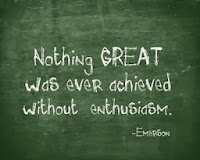 At the Social Good Summit, held at the United Nations September 22-24, 2013, Jean Case stated that the Case Foundation defines philanthropy as any active effort that promotes human welfare.
At the Social Good Summit, held at the United Nations September 22-24, 2013, Jean Case stated that the Case Foundation defines philanthropy as any active effort that promotes human welfare.Using that definition, ideas shared through the variety of social media platforms are considered equally as powerful, purposeful and necessary as money. This is a big shift in thinking that organizations like Optimist Clubs must embrace.
So often I hear Optimist Club leaders saying, "We could do more if we had more money." Or a variation of that theme is, "We could do more if we had more members." While both may be true, and while both may go hand-in-hand, it is important that we remember no matter the size of our group, we, as individuals, have something that is more engaging to share: our enthusiasm.
Enthusiasm drives interest. When I see someone's enthusiasm for a project, I want to know more and of course I want to see them succeed. If their enthusiasm is for a group or organization, again, I want to know more and I might even want to join. However, joining is going to be a subjective decision based on how well I can answer questions like:
- Will my participation make a difference?
- Is there a need for my skills?
- What else does the group do?
- Are these people I want to associate with?
- Will belonging make me happy?
- Is it easy to join?
There are more questions inside those questions and some can be answered outright while others will be answered on instinct. However, that enthusiasm quotient is going to be a driving force in my decision.
In public relations practice, gaining publicity for one's client or employer is a prime directive. Rotary International has just spent millions of dollars revamping its website and molding its appearance to appeal to the contemporary audience. Much of its work highlights the enthusiasm that individual members share for their cause and how that passion has been unified by membership in the organization. Rotary is promoting the personal stories of its members in order to gain impetus for performing activities that promote universal social good through its well-organized club model. I applaud its efforts.
But I also believe that enthusiasm is more authentic and more easily transferred when promoted on a local level. As much as I embrace the opportunity to connect with others across the globe that the social web offers, it takes smaller groups of people, passionately sharing their enthusiasm for their cause, to raise awareness at home to solve local problems. Eventually, they will connect with others who share similar interests on a regional, national and an international level. However, reaching out to the international level immediately overlooks the needs at home and when we ignore that, we lose our foundation.
Service clubs have long served as the foundation from which social good emanates. And through the social web, the ability of their members to share their enthusiasm and make a difference has been heightened. I hope that means their appeal is on the rebound as well.
